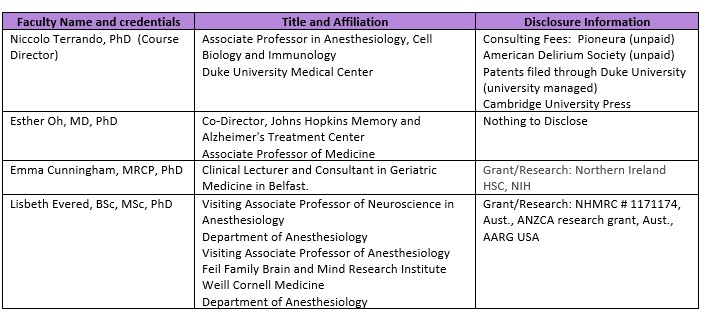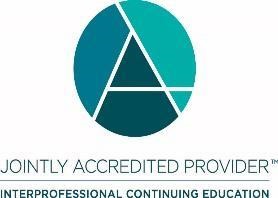The Basics of Perioperative Neurocognitive Disorders
Activity Available: May 2024 – May 2026
Education Activity Title: The Basics of Perioperative Neurocognitive Disorders
Education Activity Description: This webinar will focus on incidence and consequences of Perioperative Neurocognitive disorders (PND);Perioperative neurocognitive disorders, including postoperative delirium, are the most common complication of surgery and anesthesia for individuals aged 65y or more, occurring in up to 60% of patients. Much research focusses on blood, cerebrospinal fluid and electroencephalography biomarkers for identifying at -risk patients and developing prevention strategies. Current trials of non-pharmacological interventions look promising to optimize at-risk individuals and reduce risk of these poor outcomes.
Jointly provided by Postgraduate Institute for Medicine and Alzheimer’s Association
Learning Objectives:
- Describe the types and consequences of Perioperative Neurocognitive disorders (PND)
- Discuss and interpret various biomarkers to prevent or reduce PNDs
- Describe PND risk factors and opportunities for risk factor modification
Estimated time to complete activity: Approximately 60 minutes per webinar (1.00 Credits)
Faculty Disclosure Information

For questions, contact the clinical education staff: clinicaledu@alz.org
Accreditation Information
Disclosure of Unlabeled Use: This educational activity may contain discussion of published and/or investigational uses of agents that are not indicated by the FDA. The planners of this activity do not recommend the use of any agent outside of the labeled indications. The opinions expressed in the educational activity are those of the faculty and do not necessarily represent the views of the planners. Please refer to the official prescribing information for each product for discussion of approved indications, contraindications, and warnings.
Disclaimer: Participants have an implied responsibility to use the newly acquired information to enhance patient outcomes and their own professional development. The information presented in this activity is not meant to serve as a guideline for patient management. Any procedures, medications, or other courses of diagnosis or treatment discussed or suggested in this activity should not be used by clinicians without evaluation of their patient's conditions and possible contraindications and/or dangers in use, review of any applicable manufacturer's product information, and comparison with recommendations of other authorities.
Target Audience: This activity is intended to meet the educational needs of primary care clinicians including internists, family physicians, radiologists, neurologists, nurse practitioners and physician assistants who are seeking additional education in the assessment, diagnosis, treatment and ongoing health care of patients with cognitive impairment and dementia.
Statement of Purpose: A practice gap is the difference between what healthcare professionals should or could be doing and what they are currently doing. Using current evidence based to bridge the gap between patient care and care recommendation, ensuring healthcare professionals are not only aware of current practice but are utilizing them in patient care settings. This will be accomplished by providing participants with increased understanding of the impact of Perioperative Neurocognitive disorders (PND) through discussion of cases outlining how to interpret biomarkers to prevent or reduce PND’s.
 Joint Accreditation
Joint Accreditation
In support of improving patient care, this activity has been planned and implemented by the Postgraduate Institute for Medicine and Alzheimer's Association. Postgraduate Institute for Medicine is jointly accredited by the Accreditation Council for Continuing Medical Education (ACCME), the Accreditation Council for Pharmacy Education (ACPE), and the American Nurses Credentialing Center (ANCC), to provide continuing education for the healthcare team.
Credit Designations:
Physician Continuing Medical Education; The Postgraduate Institute for Medicine designates this enduring material for a maximum of 1.00 AMA PRA Category 1 Credit(s)™ per webinar. Physicians should claim only the credit commensurate with the extent of their participation in the activity.
Continuing Nursing Education: The maximum number of hours awarded for this Continuing Nursing Education activity is 1.00 contact hours per webinar. This activity is being presented without bias and without commercial support.
Continuing Pharmacy Education: Postgraduate Institute for Medicine designates this continuing education activity for 1.00 contact hours (0.100 CEUs) per webinar of the Accreditation Council for Pharmacy Education.
